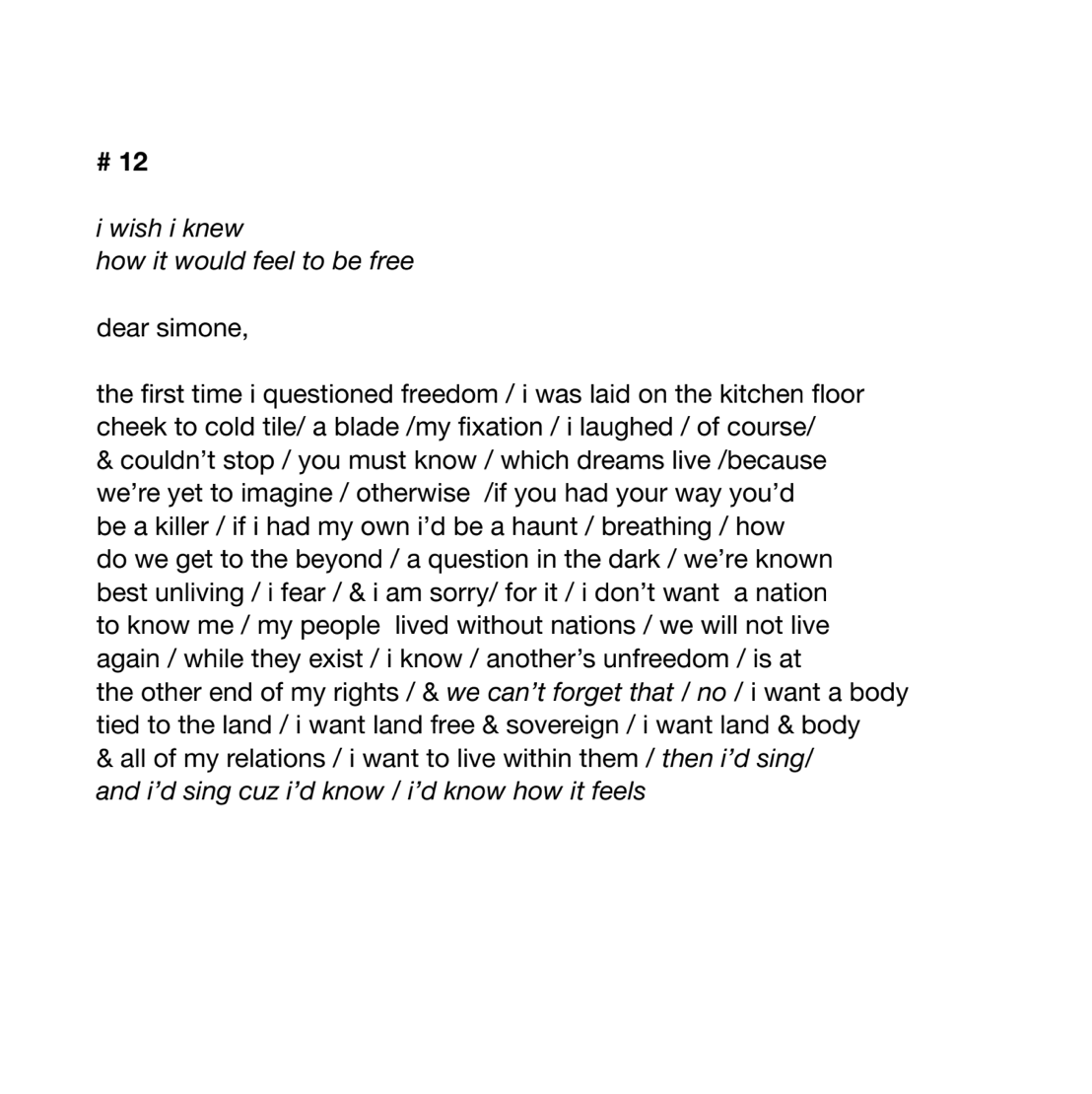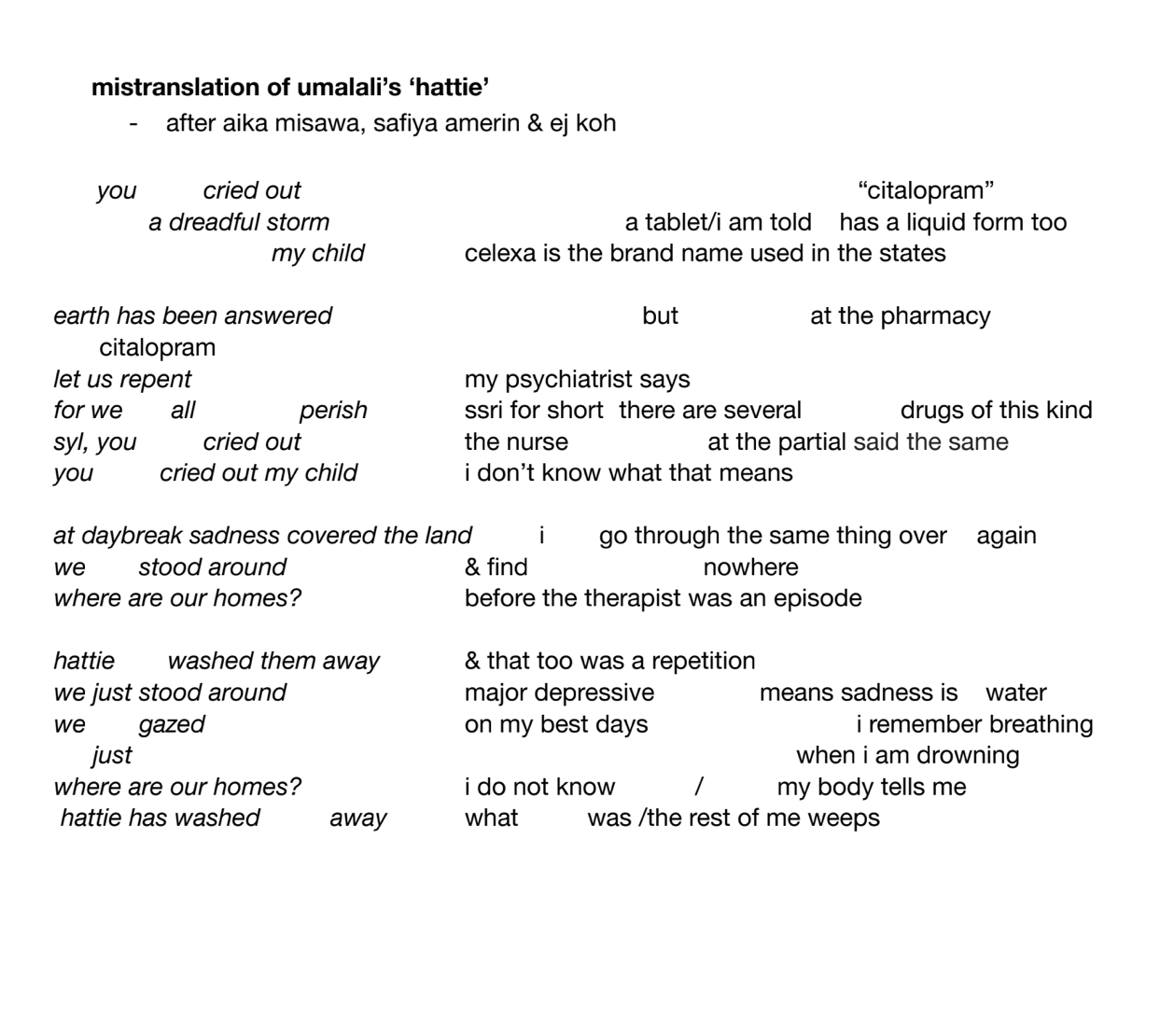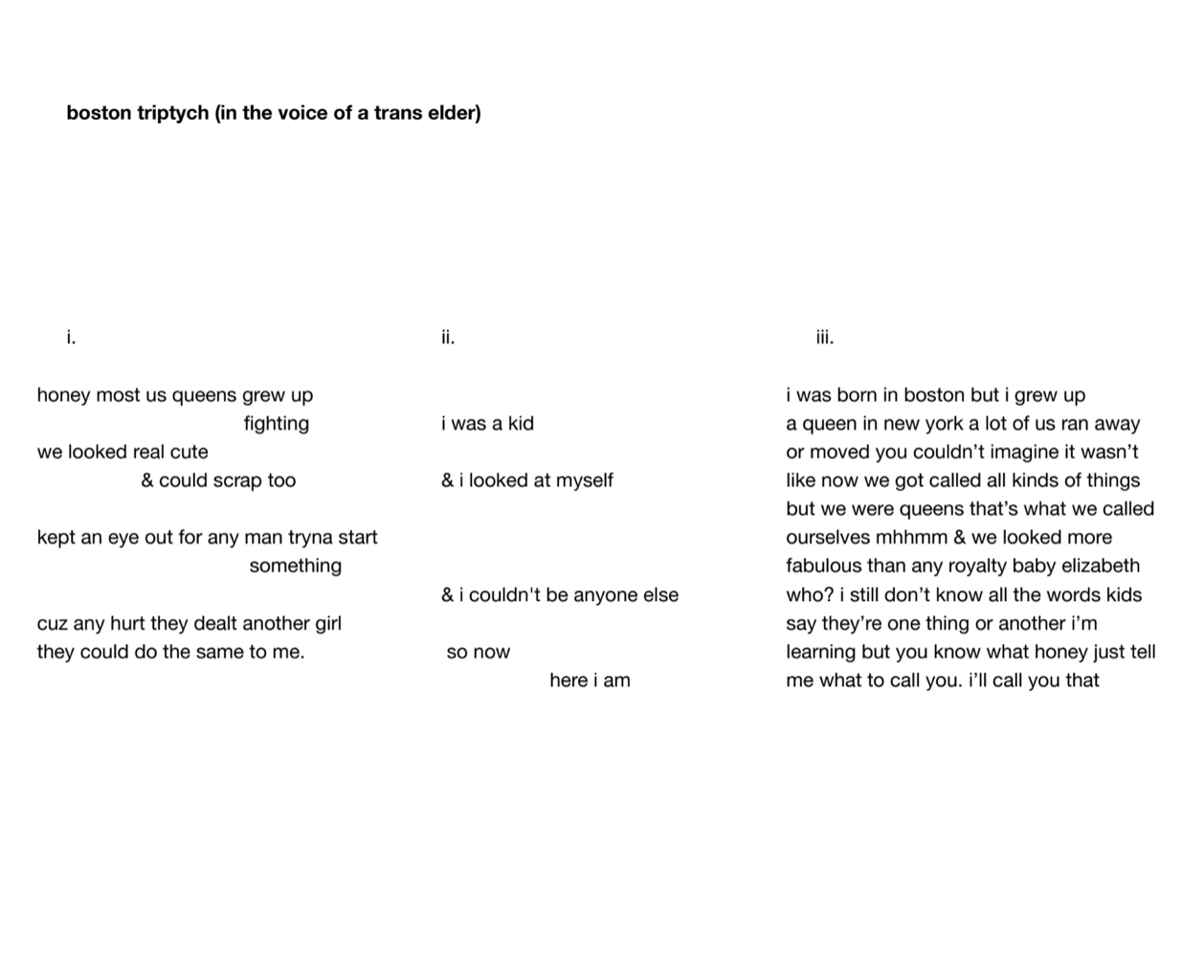



JR MAHUNG
She/TheyJR Mahung (they/she) is a Garifuna poet from the South Side of Chicago. They just finished their MFA at Umass Amherst where she also taught a mix of creative writing and general composition classes. She previously lived in Dorchester for three and a half years where she served on the organizing team for the Louder than a Bomb MA (now Wicked Loud) youth poetry slam festival. JR has helped coach poetry slam teams at Northeastern University and Smith College. When not at work, you can find JR hanging out with her cat, Frank Ocean.
Website: www.jrmahung.com/
Artist Statement:
My work begins with my people, the Garifuna. The first of which were taken from West Africa on a slave ship. The ship was caught by a hurricane and crashed off the coast of St. Vincent where these people, depending on the telling, either fought or formed community with the Arawak and Carib peoples on the Island (I think likely a mix of both).Their initial encounter is the site of inspiration for much of my artistic practice. These people, not yet Garifuna but no longer in commune with their heritage lands, who crawled through the wreckage of their entrapment to find existence outside slavehood, in community with other indigenous peoples. I am not as interested in the moment, as I am in the proces. How did these people all combine to form the Garifuna? At what moment were these peoples no longer African or Arawak or Carib? At what point did these West Africans (likely from disparate areas in the region) become indigenous to Saint Vincent?
I think, again, of the process. One group seeking freedom in another group’s embrace. My work is to mirror each side of this movement, to welcome others into the space my practice might create while also asking questions towards our liberation.
This has most recently come into play in my role as the 826 Boston Writer’s Room Coordinator at the Jeremiah E. Burke High School in Dorchester. 826 Boston is a nonprofit writing, tutoring, and publishing organization where students in grades K-12 and beyond can share their stories, amplify their voices, and develop as leaders in school and in life. The organization has hosted a Writers’ Room at the Burke since 2016.
The mechanics of my role often involve scheduling class visits for my team and me to support students with writing assignments as well as designing and facilitating writing workshops of different kinds for 9th-12th grade students. This is key as my creative writing is tied to my work as an educator.
In working with younger writers, I often am forced to return to the bare bones of my own process. I am faced with questions that, without students posing them, I find I often overlook: “how do you start a poem?”, “how do you find new inspiration?”, “What do you do when you keep writing the same thing but want to write something different?”. I am forced to be more intentional in my process and to think about my writing with greater clarity. And in speaking to students about their writing, I gain greater insight into my own.
Furthermore, as an afroindigenous artist, my work is very rooted in place--my relationship and my larger community’s relationship to the lands we move on and within. In working with students I am able to engage with the land, in part, through my students’ lenses and so in a greater number of ways. The work grounds me, quite literally, and acts as the foundation for my process.
Project Description:
Our project idea is preliminarily titled “We Out Here”. It would be a series of workshops, conversations, and generative creative writing and visual art sessions on queerness for students at The Burke High School. The sessions would take place over several months. They would focus on exploring queerness in different ways and would be facilitated by a mix of Burke staff, school partners, (possibly) students, as well as guest facilitators and arts educators. Each facilitator would be an educator and/or artist with some deep relationship to Boston, its queer POC communities, and/or to the Burke itself. The majority of facilitators would be people of color as well. Facilitation would include self discovery workshops with themes such as “exploring our gender identity”, “to be queer and of color”, “discussions of difference in Audre Lorde’s Uses of The Erotic”; creative writing workshops on craft within the work of queer artists “Cover songs as (trans)figuration”, “Writing Queernes as an Ancestor through Dan Taulapapa McMullin’s Poetry”, “Queer artists and Activism through time”; and visual art focused sessions “The Portrait as Queer resistance”, “Zines and Queer Archiving”, and “Tattoos and other community focused art practices”.
The Project would culminate in a public exhibition, or a series of public exhibitions of student work on what it means for them to be queer in spaces where queerness is often invisibleized both by those within and outside of their direct communities. The format(s) of the exhibition would vary depending on 1. The kinds of work students create and 2. Students willingness to to be publicly associated with the project and/or need for anonymity. We already have several ideas for format.
First and perhaps most ideal would be an open mic and visual art showing that would allow students to share their written work and provide space for participants to listen to and view student art while having light refreshments. The Dorchester Art project could be a possible host venue or even the Grove Hall Public Library. Another possibility would be anonymized visual and written work for public display in different locations in Dorchester with an online or printed map showing the various places where pieces from the project are housed.
We, of course, are also open to online versions of the public sharing if an in-person exhibition is not possible.
Collaborators and in-School Partners:
This project would require a mix of community collaborators and school partners. I have talked to a number of teachers and administrators in order to ensure we have support within the building. Confirmed collaborators at this point within the school include Niki Hester, writer and Program Assistant for the Burke Writer’s Room; Jessica Dellaquila, AP Government Teacher and one of the few openly queer instructors at the Burke who has volunteered to help publicize the project to students; Dr. Petta, the Senior Academy Leader, has said she will allow students to incorporate their art making into their Senior capstone projects; Alisa Rodny, Art Teacher at the Burke, is willing to teach students artistic techniques to support in their projects and will make the art room available during the school day for those working on visual art.
Possible facilitators include myself (Writer’s Room Coordinator at the Burke), Niki Hester (Program Assistant for the Burke Writer’s Room), Sarah Nwafor (Igbo Poet and Educator), Golden (Poet, Photographer, and Teaching Artist), Amanda Torres (Poet and Arts Educator), Anny Thatch (Writer, Visual Artist, and BPS graduate), and Crystal Bi (Visual Artist and Public Arts administrator).
Each facilitator was chosen based on their longstanding relationships to Boston and to Boston’s QTPOC artistic communities. Each artist is a queer and/or trans person of color and makes art exploring their queernes and/or transness. They all have direct experience working with youth in Boston and are current residents of the city. Additionally, each artist has specialty in a different medium--Golden is a photographer, Amanda Torres builds spaces for imagination through play, Crystal Bi’s practice emphasizes collective community designed projects, Sarah Nwafor’s focus is building connection with one’s inner child, Anny Thach does mixed media work that combines written and visual art forms.
The hope is that students would find inspiration through these workshops to create a range of art pieces that could be displayed in public across Dorchester and then could publicly (or as publicly/privately as is comfortable) speak to their process.
For young people, queerness is often framed as a “new sensation”, some trend that they are trying out until they grow out of it. This (mis)understanding of queerness impacts students who, at times, are not taken seriously or even derided as they come into their identities.
These students are denied space to be themselves and are also excluded from a variety of spaces that assume young people are all cisgender and heterosexual. This includes gym classes and locker rooms, sex ed classes, and many other peer interactions that rely on normative gender as the primary form of relation. For those students, it is not always clear where the space might be available to express attraction outside of cishet desire and even further, it can be uncertain what spaces are safe for young people to share such desire, wants, needs, and understandings of themselves.
Furthermore, For queer and trans people, age and time can function in a tight loop. I have been in rooms of queer folks decades in age apart, everyone learning from each other--elders explain how they used Craigslist personal ads “back in the day” to seek romance and community, others speak to how they understood themselves as butch until they named themselves trans as they learned from younger people. Younger queers listen and learn the histories of activism that went into the right for gender affirming healthcare through MassHealth, or learn techniques for how to pass on a budget--what makeup to wear and how, how to play up femme or masc features for different body types, how to set boundaries with blood relations. These spaces are often important because so many queer people are denied access to queer histories, whether it is queer figures throughout world history or queer relations who we have minimal contact with.
The project will primarily be hosted in our Writer’s Room space, which is embedded within the fabric of school but also not a school entity itself. Because of this, we are uniquely positioned to set space in a way that consistently centers queerness and especially centers the students’ experiences of queerness.
Through the 826 Boston Writer’s room at the Burke High School, we hope that “We Out Here” will allow folks to unravel the tight coil of queer time so that a broader community might be able to access queer knowledge and queer community where it may not always seem immediately accesible. It’s about setting space for queer students to explore their identities and learn from the experience of others, especially older queer and trans art practitioners. It’s a space we hope to bring beyond the walls of The Burke so that residents in the wider Dorchester Community might feel seen and feel held through the final display as well.